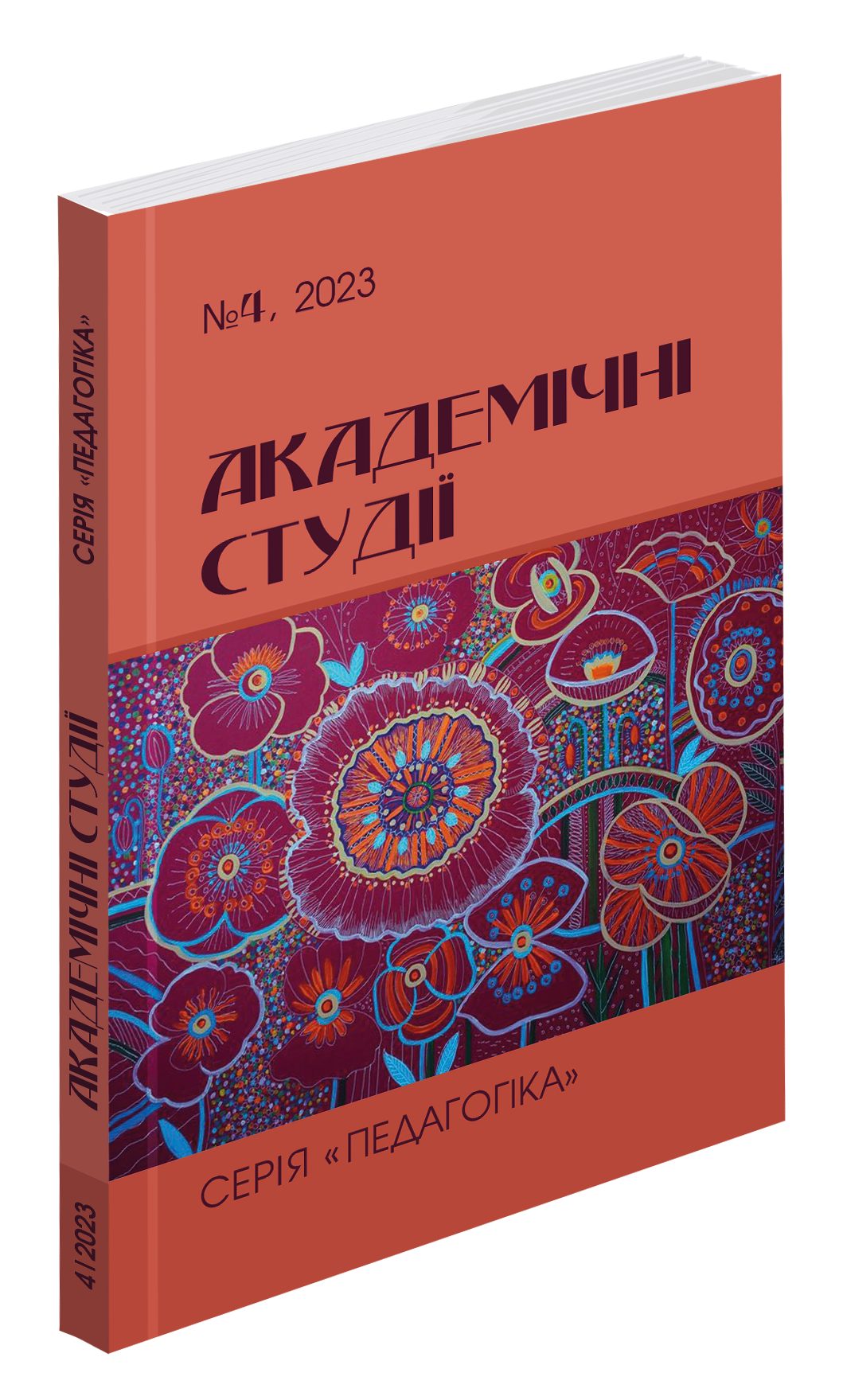Abstract
It is highlighted the degree of formation of academic integrity at the 1st and 2nd educational and scientific levels, characterized the methods and ways of developing the academic integrity culture in graduate students, and it is proved the need to improve the ways of developing the culture of academic integrity at the 3rd educational and scientific level. Academic integrity is a set of ethical principles and rules defined by law, which should be guided by the participants of the educational process during learning, teaching and carrying out scientific (creative) activities in order to ensure trust in the results of studies and/or scientific (creative) achievements in accordance with the Law of Ukraine «On Education» dated September 5, 2017. The object is the academic integrity culture of higher school graduates, and the subject is the step-by-step formation of the academic integrity culture at various educational and scientific levels (I-bachelor’s, II-master’s, III-postgraduate). The aim of the article is to determine the relevance of the formation and development of the academic integrity culture at the III level of education. It has been established that familiarization with the academic integrity culture at all levels occurs through the prism of (anti)plagiarism actions, other norms and rules for compliance with academic integrity are hardly paid attention to. Higher education institutions mostly provide generalized information for the entire educational and scientific process without specification for each faculty, department, discipline, which complicates the process of understanding between the subjects of the academic process. Subjects for the formation of academic integrity culture are bachelor students, master students, scientific and pedagogical workers, and such a link as a graduate student, doctor of philosophy is mostly left out of attention, or is considered together with others, which is inappropriate, since the role and requirements to the acquirer of the third level of education are different from the previous levels.
References
ЗУ Про освіту: Про освіту. Закон України від 05.09.2017 р. Відомості Верховної Ради (ВВР). 2017. URL:
http://zakon3.rada.gov.ua/laws/show/2145-19
ОП ТНПУ ім. В. Гнатюка: Освітня програма ТНПУ ім. В. Гнатюка. URL: https://tnpu.edu.ua/about/public_
inform/akredytatsiia%20ta%20litsenzuvannia/osvitni_prohramy/bakalavr/inoz/035.041_2023.pdf
Силабус 035 ОП ТНУ ім. В. Гнатюка. URL: https://tnpu.edu.ua/navchannya/sylabusy/bakalavr/efd/035-041/
Akademichne_pysmo.pdf
ПНД АкК: Програма навчальної дисципліни Академічна культура Національного педагогічного університету імені М.П. Драгоманова. URL: https://drive.google.com/drive/folders/1JcQVeJdFljKOeSJAkDk4R1uzUtOo9O6o
ОП ДДПУ ім. І. Франка: Освітня програма Драгобицького державного педагогічного університету ім. Івана Франка. URL: https://dspu.edu.ua/wp-content/uploads/2023/06/filologiya-anglijska-nimecka-movy-taliteratury-
pereklad-vklyuchno-bakalavr.pdf
ОП КДПУ: Профіль освітньо-професійної програми КДПУ. URL: https://drive.google.com/file/
d/1mP0j9KyL7uULrE7PwGZFl7_zAptKWyJc/view
ОП ТНПУ ім. В.Гнатюка 035 магістри: Освітня програма ТНУ ім. В. Гнатюка. URL: https://tnpu.edu.ua/about/
public_inform/akredytatsiia%20ta%20litsenzuvannia/osvitni_prohramy/magistr/inoz/035.041_2023.pdf
Силабус1 ТНПУ ім. В. Гнатюка 035 магістри: Силабус Філософія науки Тернопільського національного
педагогічного університету імені Володимира Гнатюка. URL: https://tnpu.edu.ua/navchannya/sylabusy/magistr/
efd/014-021/Filosofiia%20nauky.pdf
Силабус2 ТНПУ ім. В. Гнатюка 035 магістри: Силабус Академічне письмо Тернопільського національного
педагогічного університету імені Володимира Гнатюка. URL: https://tnpu.edu.ua/navchannya/sylabusy/magistr/
efd/014-021/Akademichne%20pysmo.pdf
Силабус3 ТНПУ ім. В. Гнатюка 035 магістри: Силабус Педагогічна практика ТНУ ім. В. Гнатюка. URL: https://tnpu.edu.ua/navchannya/sylabusy/magistr/efd/014-021/Pedahohichna%20praktyka.pdf
Силабус4 ТНПУ ім. В. Гнатюка 035 магістри: Силабус Наукова практика Тернопільського національного
педагогічного університету імені Володимира Гнатюка. URL: https://tnpu.edu.ua/navchannya/sylabusy/magistr/
efd/014-021/Naukova%20praktyka.pdf
ОНД: Організація наукових досліджень. URL: https://drive.google.com/drive/folders/1WjMn0xMujHIe4g0m5_
JGVU-z5Sqo7Hdb
Силабус5: Силабус курсу Академічне письмо (англійською мовою) для докторських студій ТНУ ім. В. Гнатюка. URL: https://drive.google.com/drive/folders/1GvJW82w3-YHUB5J8e8DaEBZzYSNuGHTg
Силабус6: Силабус курсу Організація наукової діяльності ТНУ ім. В. Гнатюка. URL: https://drive.google.
com/drive/folders/1GvJW82w3-YHUB5J8e8DaEBZzYSNuGHTg
НП Філософія науки: Навчальна програма дисципліни Філософія науки Національного університету
імені М.П. Драгоманова. URL: https://npu.edu.ua/images/file/vidil_aspirant/Programy_vstypy/Filosofia_nayku_
navchalna2020.pdf
РП Філософія науки: Робоча програма дисципліни Філософія науки Національного університету
імені М.П. Драгоманова. URL: https://npu.edu.ua/images/file/vidil_aspirant/Programy_vstypy/Filisigia_nayku_
robocha_2020.pdf
Semenog, O. M. Academic culture as a composition of national innovation security. UNESCO Chair Journal “Lifelong
Professional Education in the XXI Century”. 2020. (2), P. 48–53. DOI: https://doi.org/10.35387/ucj.2(2).2020.48-53
Згуровський М. Дипломована псевдоосвіта, або Суперечності перехідного періоду у сфері вищої освіти
України. Дзеркало тижня. 2006. URL: http://gazeta.dp.ua/EDUCATION/diplomovana_psevdoosvita_abo_superechnosti_
perehidnogo_periodu_u_sferi_vischoyi_osviti_ukrayini.html
Кузьменко1: Кузьменко А.О. Вимоги до доктора філософії в Україні як суб’єкта академічної доброчесної діяльності. Актуальні питання гуманітарних наук: міжвузівський збірник наукових праць молодих вчених
ДДПУ ім. І. Франка. Дрогобич. Видавничий дім «Гельветика». 2021. В. 45. Т. 2 С. 137–144. DOI: https://doi.
org/10.24919/2308-4863/45-2-23
Кузьменко2: Кузьменко А.О. Історія становлення академічної доброчесності у закладах вищої освіти України. Педагогічні науки: теорія та практика. Запоріжжя. Гельветика. № 3 (39). 2021. С. 167–172. DOI: https://doi.
org/10.26661/2786-5622-2021-3-23
